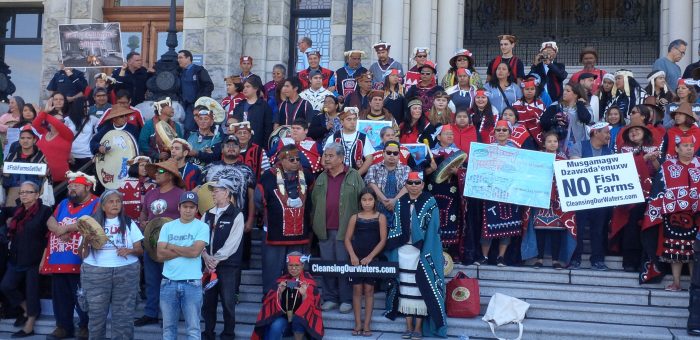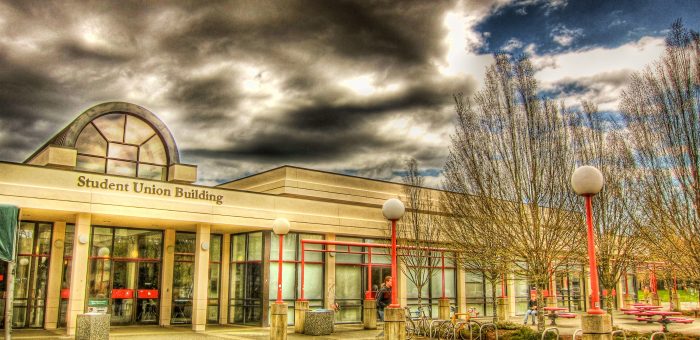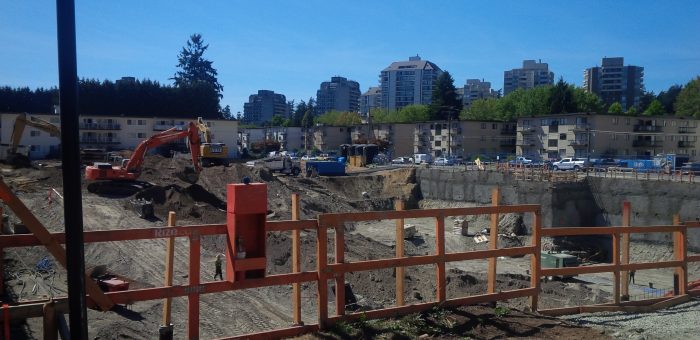Issues & Community Blog - Andrew Weaver: A Climate for Hope - Page 111
Standing with the Musgamagw Dzawada’enuxw Nation on Open Net Salmon Farming
Today I had the distinct honour of standing with the Musgamagw Dzawada’enuxw Nation in demanding the removal of open net fish farms from their traditional territories. I went one step further in stating that a BC Green government would ensure that those holding permits for open net fish farming along the migratory route of wild sockeye salmon would be given 90 days notice that their permits would be revoked. In addition, and unlike both the BC NDP and the BC Liberals, the BC Greens will not accept corporate donations from those involved in the open-net Atlantic Salmon farming industry,.
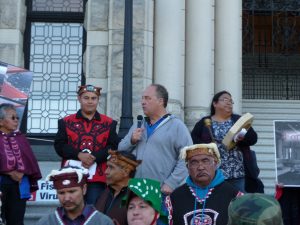 It’s not that the Musgamagw Dzawada’enuxw Nation and I are alone. In May 2015 I introduced a petition by 108,848 people who asked the government to please not issue licenses of occupation to salmon farms trying to expand in British Columbia. I also introduced a second petition signed by more than 100 business organizations across the province who supported the individuals who signed the larger petition. The business organizations argued that they are convinced by the published scientific evidence that open net salmon farms are a threat to B.C. wild pacific salmon.
It’s not that the Musgamagw Dzawada’enuxw Nation and I are alone. In May 2015 I introduced a petition by 108,848 people who asked the government to please not issue licenses of occupation to salmon farms trying to expand in British Columbia. I also introduced a second petition signed by more than 100 business organizations across the province who supported the individuals who signed the larger petition. The business organizations argued that they are convinced by the published scientific evidence that open net salmon farms are a threat to B.C. wild pacific salmon.
This doesn’t mean that we have to shut down salmon farming. Rather, it means that we have to start using closed containment systems that pose no threat to our wild salmon. In fact, we need look no further than the Namgis First Nation on Vancouver Island who have initiated a sustainable land-based salmon farming industry on their traditional lands.
Designated long-term rental units desperately needed
Skyrocketing real estate markets across the Lower Mainland and Southern Vancouver Island are dragging the rental market with them.
Frances Bula recently wrote in The Globe and Mail, “as people are shut out of the housing market, more people have no choice but to remain as renters who are competing for a limited supply of housing in a system that has treated renters like second-class citizens for decades.”
She’s right, and for people who are young, non-white, have mental health issues, unemployed, recent immigrants, poor, disabled, or have pets, finding a safe, affordable home can seem nearly impossible in markets with vacancy rates around 0.6 per cent like Victoria.
With constrained real estate mobility, people have little choice but to stay in suites that would have previously been viewed as shorter-term student rentals and I am getting increasingly concerned about where the young people in my riding are going to live this upcoming school year. A representative from Camosun College told us he too is very worried about the situation and described it as a complete crisis with some students living in cars and others forced into overcrowded, expensive shared suites.
We so desperately need more designated long-term rental units in B.C. Spaces that people can make their home, places that welcome children and pets and have some outdoor space. Homes for people who will rent for large portions of their life, either by necessity or choice.
Co-operative housing arrangements are another promising avenue to bridge the gap between the rental and homeownership markets. They provide shareholders with a long-term, sustainable home and create diverse communities, supporting multi-generational residents of varying income levels.
Unfortunately, few co-operative housing developments have been built in B.C. since the 1990s when the federal government released its social housing responsibility to the province and existing units have multi-year waitlists. Given our current housing crisis, and the province’s new Housing Priority Initiatives Fund, I think the B.C. Liberals, in conjunction with municipalities and the federal government, need to step in to help housing co-operatives with land acquisition and planning costs.
Each level of government has various tools available to them that they can use to tackle the housing crisis from different angles. To guide these initiatives we need, and have needed for years, more comprehensive data about the trends impacting our housing market. The information about buyer nationality that the province began collecting this June is a start, but making major policy decisions based on five weeks of data – as the B.C. Liberals did with Bill 28 – is far from ideal.
Knowing that we are going to be faced with challenging housing decisions for years to come, we need to start collecting more data now so we can design informed policy for the future. Determining who is purchasing homes, and how many, in B.C. would allow the government to identify the flow of foreign investments, the role corporations are playing, and whether we are seeing speculation in our market coming from other regions in Canada.
Tracking house flipping (when investors buy a house to quickly resell it at higher price) is an important aspect of understanding an over-inflated market. Imposing a sales tax on homes sold within one or two years of purchase could be an effective way of curbing house flipping but, again, it is a policy that should be founded in comprehensive data.
Studying the impact of Airbnbs, I suspect, would shed a lot of light on changes happening in the rental market. Airbnb has already said it’s open to some restrictions tailored to tight rental markets, including banning hosts from using the popular online platform to run a business renting out multiple units, but governments (municipal and provincial) will need solid data to move forward with such policies.
Long-term and ongoing data collection is vital to the future of homes in B.C. – the sooner we start the better.
Feature photo by Josefontheroad.
Rental market crisis taking root in B.C.
When I analyzed the rental market in my riding of Oak Bay and Gordon Head, in the Greater Victoria area, I wasn’t surprised by how bad it has gotten.
I know the rental availability rate is at 0.6 per cent in Victoria, I have spoken to residents desperately trying to find an affordable home, I have watched skyrocketing housing prices drag the rental market with them, I have heard about homeless UVic and Camosun students sleeping in cars. I wasn’t surprised as I looked through the rental listings on Craigslist, but I was very angry.
For several years now I have been raising housing issues in the legislature. The government has responded dismissively, refusing to acknowledge the housing crisis that loomed before us.
Now, fresh into an election year, protecting the dream of homeownership has apparently become their motto. They are throwing hastily put together, Vancouver-centric band-aid policies at a housing emergency that is reverberating through the entire province.
The B.C. government has failed to protect a fundamental right for British Columbians, and with the start of the school year fast approaching I am getting increasingly concerned about where the university and college students in my riding are going to live. The University of Victoria alone enrols over 21,000 students. Many UVic and Camosun students will live in residence or with family – UVic has about 2,300 residence beds and 180 family housing units but many others will need to find somewhere to rent for the year.
On Aug. 9 my office went through every Oak Bay and Gordon Head rental listing on Craigslist. There were only 106 and they ranged from $700 per month for a one-bedroom basement suite to $10,000 for a six-bedroom house.
Of the 106 listings, 29 fit my vaguely affordable cutoff of less than $1,000 monthly per person. Most of them were multiple bedroom suites that would have to be split between roommates.
The $2,700 three-bedroom unit, for example, could be shared at $900 per occupant. Not exactly cheap for a student without an income, but more attainable than the $1,500 being charged for a 450-square-foot basement suite. With so few listings, though, I do worry that student renters will be chosen last when bidding against professionals or families. I had a staff member contact a few of the listings that I thought would be suitable for roommates to ask if they would consider renting to a group of students and none replied.
For individuals or couples hoping to find a one-bedroom suite for under $1,000 in my riding, on the day I checked there were seven listed. Some listings welcomed higher bids and many apologized for not being able to respond to every inquiry, citing an overwhelming number of applications. But frustrations with the rental market should not be deflected onto landlords, they too are trying to manage costs in an unhinged housing market.
Frustration, anger and outrage about housing in B.C. needs to land squarely with the B.C. government for actively neglecting this issue until it became a crisis.
As Frances Bula wrote in The Globe and Mail, the housing market has long treated renters like second-class citizens and the current housing shortage is further excluding people who are young, non-white, have mental health issues, unemployed, recent immigrants, poor, disabled or have pets. Our government needs to move beyond their dream of homeownership talking point. There is a rental market crisis in British Columbia that is in desperate need of attention. We need policies that work to get people into safe, affordable homes – like those I have repeatedly outlined for the government – and we need it to start now so that come September students won’t be left sleeping on library benches.
Feature image by Nick Kenrick
The growing demoviction crisis in Burnaby – a path forward
Many might not be aware that an emerging, and entirely preventable, crisis in affordable rental accommodation is developing in the Burnaby Metrotown area. Perhaps the reason for this is that neither the government nor the official opposition has been raising this issue publicly. That’s one of the reasons why I accepted an invitation from the Metrotown Residents’ Association to tour the region on August 18th. While my visit to the area generated some excellent local media coverage in Burnaby Now and Vancouver 24 hours, I thought it was important for me to expand upon what I learned from my tour.
Background
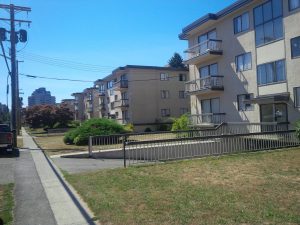 The issue that Burnaby is now facing has arisen from recent and imminent changes in policy. The first concerns legislative changes to the Strata Property Act that were passed in Bill 40, Natural Gas Development Statutes Amendment Act, 2015. An obvious question concerns why changes to the Strata Property Act were passed within a Natural Gas Development Statutes Amendment Act. There is, of course, no justifiable reason for this to have occurred. My own opinion is that it was done simply because Richard Coleman is the Minister of Natural Gas Development and also the Minister Responsible for Housing. By burying housing amendments in a natural gas bill the minister was able to deal with his entire portfolio at once. Bill 40 contained provisions that allowed Stratas to be dissolved (and hence the property sold) with only 80% instead of 100% of strata owners agreeing.
The issue that Burnaby is now facing has arisen from recent and imminent changes in policy. The first concerns legislative changes to the Strata Property Act that were passed in Bill 40, Natural Gas Development Statutes Amendment Act, 2015. An obvious question concerns why changes to the Strata Property Act were passed within a Natural Gas Development Statutes Amendment Act. There is, of course, no justifiable reason for this to have occurred. My own opinion is that it was done simply because Richard Coleman is the Minister of Natural Gas Development and also the Minister Responsible for Housing. By burying housing amendments in a natural gas bill the minister was able to deal with his entire portfolio at once. Bill 40 contained provisions that allowed Stratas to be dissolved (and hence the property sold) with only 80% instead of 100% of strata owners agreeing.
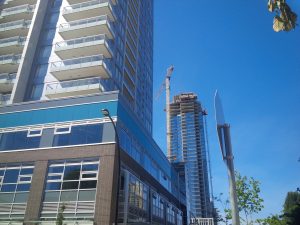 The second important policy change is that the municipality of Burnaby is moving towards rezoning low-rise areas to mid- and high-rise in and around the Metrotown skytrain station. While in and of itself this might sound like a fine idea — by increasing density you increase availability of housing stock — the reality is that it is compounding the affordability crisis in the area. Below I’ll attempt to outline why this is the case.
The second important policy change is that the municipality of Burnaby is moving towards rezoning low-rise areas to mid- and high-rise in and around the Metrotown skytrain station. While in and of itself this might sound like a fine idea — by increasing density you increase availability of housing stock — the reality is that it is compounding the affordability crisis in the area. Below I’ll attempt to outline why this is the case.
But first, I’d like to thank the Metrotown Residents’ Association for inviting me to participate on the tour. I’m also grateful to the residents of the Maywood, Marlborough and Cedar Place who took the time to speak with me.
The problem
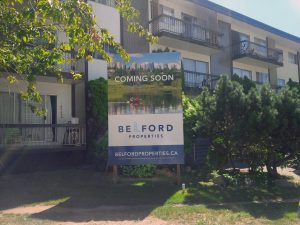 In recent years there has been a dramatic increase in the number of demolition permits that have been issued by the City of Burnaby. Older, low rise apartment buildings are being bought up at an alarming rate by developers whose intention is to demolish them and turn them into high end condominiums. Now in theory, as I note above this might sound like a great idea. The current stock of rental housing is dated and densification increases housing supply. But in reality, what is happening is that lower income rental housing is being replaced by higher income luxury condominiums. The result is that these lower income people are displaced and have nowhere to go. This is particularly troubling as Burnaby is ranked dead last in terms of affordability in the Canadian Rental Housing Index.
In recent years there has been a dramatic increase in the number of demolition permits that have been issued by the City of Burnaby. Older, low rise apartment buildings are being bought up at an alarming rate by developers whose intention is to demolish them and turn them into high end condominiums. Now in theory, as I note above this might sound like a great idea. The current stock of rental housing is dated and densification increases housing supply. But in reality, what is happening is that lower income rental housing is being replaced by higher income luxury condominiums. The result is that these lower income people are displaced and have nowhere to go. This is particularly troubling as Burnaby is ranked dead last in terms of affordability in the Canadian Rental Housing Index.
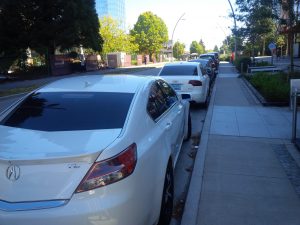 Metrotown mall and the Metrotown skytrain station are immediately adjacent to the neighbourhoods that are being affected. The proximity of rapid transit is particularly important to the residents living in the area who rely on it to get to their employment. At the same time, it was evident that the residents moving into the newer high-end condominiums are far more affluent. One can readily see this simply by looking at the cars parked along the residential streets immediately in front of the new constructions as opposed to the older ones.
Metrotown mall and the Metrotown skytrain station are immediately adjacent to the neighbourhoods that are being affected. The proximity of rapid transit is particularly important to the residents living in the area who rely on it to get to their employment. At the same time, it was evident that the residents moving into the newer high-end condominiums are far more affluent. One can readily see this simply by looking at the cars parked along the residential streets immediately in front of the new constructions as opposed to the older ones.
The response by Burnaby’s Mayor has been to blame the provincial and federal government for the problem. I find this odd in that zoning falls squarely within municipal jurisdiction and that municipalities have the power to create standards of maintenance bylaws which can incentivize upkeep of existing stock. They also have wide discretion as to how they use funds acquired from developers through the granting of increased density. Of course, the development of affordable rental housing, like Cedar Place in Burnaby, often requires the investment of resources from multiple levels of government, but it’s simply not good enough to pass the blame to someone else.
 Residents in the area that I talked to spoke of the constant stress that they are living with as they wonder if their apartment building will be next. They have tried to organize and meet regularly. Unfortunately, several of them told me that whenever they put up posters advertising their next gathering, the posters are quickly blacked out, like the example shown to the right.
Residents in the area that I talked to spoke of the constant stress that they are living with as they wonder if their apartment building will be next. They have tried to organize and meet regularly. Unfortunately, several of them told me that whenever they put up posters advertising their next gathering, the posters are quickly blacked out, like the example shown to the right.
So what is being done for those being evicted. The honest answer is that virtually nothing is being done. Burnaby council seems to be turning a blind eye as the demoviction problem gets out of hand. Rather than recognizing that the municipality has a moral obligation to look out for the best interests of their constituents, they seem content with the knowledge that property taxes and developer funds acquired through granting increased density will increase the City’s coffers. In fact, Burnaby’s Mayor has been reported to have said “he’s not about to give in to downloading what he says are provincial and federal responsibilities.”
The solutions
Burnaby council doesn’t have to look far to get a sense of what they might do. Under the leadership of Gregor Robertson the City of Vancouver has taken numerous steps to incentivize the development of rental houses. At the same time they successfully petitioned the provincial government to bring in enabling legislation that would allow Vancouver to introduce a vacancy tax that would penalize those purely speculating in the marketplace.
Burnaby did not. In fact, I wrote to Burnaby Mayor and Council in May asking them for their views on the vacancy tax. As I have written about earlier, the addition of the vacancy tax only into the Vancouver Charter and not the Community Charter as well (which other communities like Victoria and Oak Bay have been calling for) makes no sense at all. For example, on one side of Boundary Road (in Vancouver) a vacancy tax could be applied; on the other side of the street (in Burnaby), it would not. I never received a response or even an acknowledgement that my letter was received. In addition, Burnaby has the jurisdictional ability to slow the pace of demovictions to ensure that the construction of affordable, rental accommodation keeps pace with the increased densification.
Unlike the more progressive housing approach of Vancouver, Burnaby’s response to the affordability crisis has been to call on the BC government to allow municipalities to introduce “rental-only” zoning. The BC NDP have also been musing over the possibility of introducing legislation that would allow rental-only zoning options for municipalities. In my view this is not a solution. In fact, I would argue that this has the potential of being disastrous as it would potentially lead to the development of big city ghettos as found in other jurisdictions world wide.
Climate Action Announcement Definitely Not Leadership
Media Statement – August 19, 2016
Climate Action Announcement Definitely Not Leadership
For immediate release
Victoria B.C. – Andrew Weaver, MLA for Oak Bay – Gordon Head and leader of the B.C. Green Party calls the B.C. Government Climate Action announcement disappointing and lacking leadership.
“Not only has the Clark government dismantled many of the existing climate policies, but they are also ignoring key recommendations from their own expert panel on what needs to happen for B.C. to once again become a climate leader.
“For the past few years it has become painfully clear that the B.C. Liberals have chosen to forgo any leadership on this file, instead choosing to chase the LNG pipedream.
“As we go into another year with temperature records again being smashed across the world and in B.C., this government is content to fiddle and play games with carbon accounting. Without increasing the carbon levy there is no hope that British Columbia will meet its GHG reduction targets.
“For fifteenth consecutive month in a row, July 2016 emerged as the warmest month since measurements have been collected. Average global temperatures for the year-to-date period January-July 2016 shattered the previous record set in 2015. The government’s plan doesn’t demonstrate leadership. It demonstrates complacency and a wilful disregard of the urgency of dealing with climate change.
“British Columbia has an opportunity to become a leader in this world, establishing a 21st century economy built on innovation and clean technology. This goal cannot be realized with the current administration’s directionless approach to governance.
– 30 –
Backgrounder – Changes since Christy Clark became Premier
Under Premier Gordon Campbell, British Columbia emerged as an international leader in climate policy. But since Christy Clark has taken over at the helm, we’ve move from being a leader to becoming a laggard. The legacy of Premier Clark’s so-called climate leadership to date is as follows:
- The Clean Energy Act was amended to exclude emissions for liquefaction in LNG industry;
- The Pacific Carbon Trust was shut down;
- Carbon tax increase were halted;
- Cap and Trade enabling legislation (designed to bring big point source emitters in with California) has been repealed;
- We have a new Greenhouse Gas Industrial Reporting and Control Act that introduces an “emissions intensity” framework that is more about supporting an LNG industry than limiting emissions;
- The LiveSmart BC program has essentially shut down;
- Emissions have gone up year after year;
- We will not reach our legislated 2020 GHG reduction target.
Media contact
Mat Wright – Press Secretary, Andrew Weaver MLA
1 250 216 3382
mat.wright@leg.bc.ca

